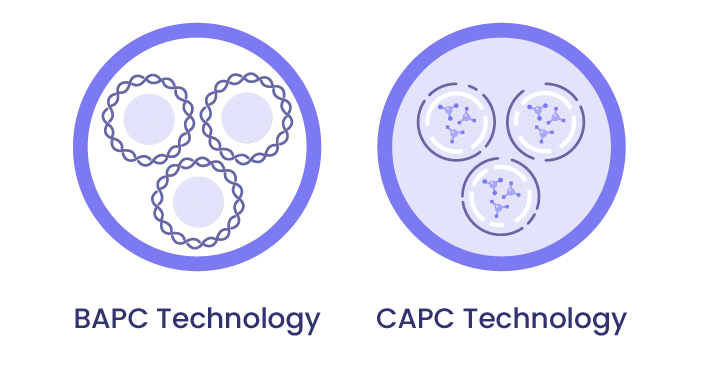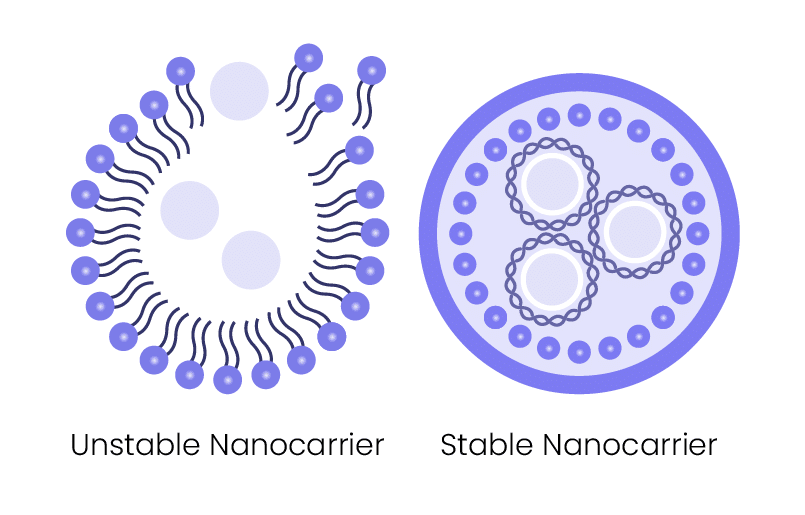Nanocarriers are transportation agents that encapsulate substances like drugs for delivery throughout the body. Nanocarriers are characterized by their small size, diversity, and ease of engineering in laboratories.
At Phoreus Biotech, our specialized corralling amphipathic peptide colloids (CAPC) and branched amphipathic peptide capsules (BAPC®️) nanocarriers optimize drug delivery while minimizing a patient’s risk of cellular toxicity.
What Is a Nanocarrier?
A nanocarrier is any small nanoparticle that transports substances throughout the body. Commonly used nanocarriers include lipid-based vehicles, such as liposomes or micelles, but can comprise various compositions. Nanocarriers are beginning to see some success in treating diseases like cancer. They are also optimizing the delivery of novel vaccines into the body.
Benefits of Nanocarriers
As a drug delivery vehicle, nanocarriers are highly effective at transporting compounds throughout the body due to their size and adaptable surface characteristics. In the laboratory, the qualities of these particles, such as size and composition, can be altered to optimize performance.
Additionally, nanocarriers can be engineered to target a specific region within the body, directly administering treatment to diseased cells. A drug’s degradation as it travels throughout the body is lessened because the treatment dosage reaches targeted cells when packaged in a stable nanocarrier. Nanocarriers can be designed to avoid triggering the body’s immune response, thus ensuring the drug’s safe delivery.
Phoreus Biotech Uses Engineered Nanocarriers
Our CAPC and BAPC®️ nanocarrier technologies are self-assembling peptides. Our engineered nanocarriers are designed to transport nucleic acids and compounds with poor drug solubility when delivered to the body. Our CAPC and BAPC®️ vehicles can be modified to target affected cells, present low cytotoxicity, and are highly biodegradable.
While our CAPC and BAPC®️ technology are peptide-based nanocarriers, their specialization lies in their unique delivery of different substances.
CAPC
Our corralling amphipathic peptide colloids are a specialized class of nanocarriers with a base amino acid sequence that was derived from naturally occurring protein. At Phoreus Biotech, we have engineered our amphipathic peptide technology to deliver small hydrophobic substances.
These substances often present solubility and tissue distribution issues, but our CAPC nanocarriers can quickly enter a targeted region.
Our CAPC technology works via endocytic pathways to cross a target cell’s membrane. Once the nanocarrier has entered the cell, it begins breaking down. Due to a pH change, the nanocarrier’s contents are released. CAPC nanocarriers can also be engineered in sizes from 200 nm to 5 microns and allow for rapid cellular uptake to optimize your drug delivery needs.
BAPC®️
Similarly to CAPC technology, our branched amphipathic peptide capsules are formulated using our proprietary branched amphipathic peptides. Our BAPC®️ technology optimizes the delivery of nucleic acid constructs, by protecting the cargo from nucleases that can inactive them prior to intracellular delivery.
Like our CAPC technology, our BAPC®️ technology is quickly enveloped by a target cell’s membrane. Once it enters the cell, the BAPC®️ releases the delivered nucleic acid cargo as a change in pH occurs. BAPC®️ nanocarriers also present rapid cellular uptake without posing immunogenic or cytotoxicity risks.
Importance of Using a Stable Nanocarrier
Unstable nanocarriers can have a range of negative consequences for targeted drug therapy, including premature drug release resulting in little therapeutic effect for affected areas and cell toxicity. Nanocarriers made from lipid-based compounds have been shown to pose a greater risk of cell toxicity when compared to protein-based nanocarriers.
The Phoreus team has built a better nanocarrier capable of reaching targeted cells without risking the health of unaffected cells or premature drug release.
Current Trends in Nanocarrier Research
Nanocarrier research has demonstrated wide success in the delivery of cancer treatment drugs. The most significant risk of chemotherapy drugs is the cytotoxicity that threatens healthy cells. While cancer drugs are tumor-killing, their lack of targeting leads to healthy cells dying off too.
Due to their easily programmable nature, nanocarriers can be formulated to target tumor cells actively by adding ligands or targeting moieties unique to cancerous cell receptors. Using Phoreus Biotech nanocarriers, cancer treatments can be effectively delivered to the affected cells without harming healthy cells.
Learn More About Nanocarriers for Transdermal Drug Delivery
Transdermal drug delivery refers to delivering drugs via skin absorption. Nanocarriers are a promising vehicle for transdermal drug delivery because they help prevent drug degradation and whole-body side effects and offer convenient application. Nevertheless, laboratories have found it challenging to engineer nanocarriers that penetrate the skin barrier, control drug release, and precisely target affected cells.
At Phoreus, we can suit your drug delivery needs with our BAPC®️ and CAPC nanocarriers. Read our FAQs about BAPC®️ technology for more information about our specialty nanocarriers.

